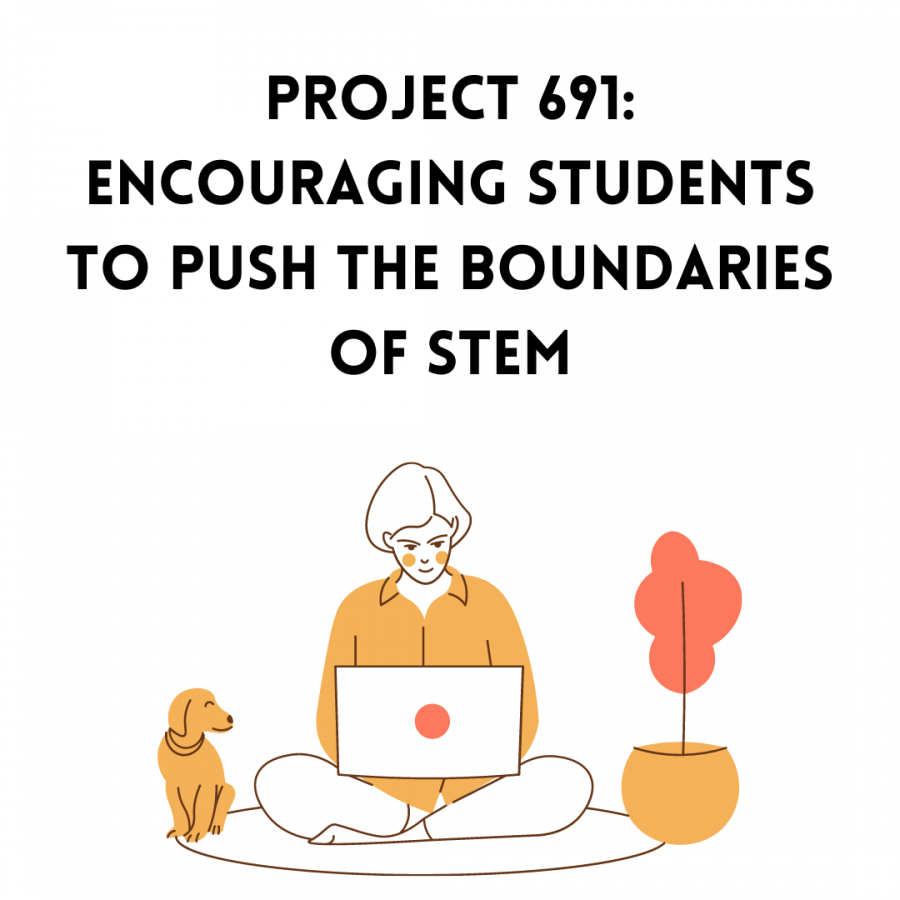Project 691: encouraging students to push the boundaries of STEM
May 27, 2021
Today, STEM plays an important role in our society. It allows engineers to create the technology to send rovers to Mars. It powers our homes. It creates the technology behind the phones, cars, and other important necessities in our lives today. One club at West Ranch is giving students a firm foundation in the STEM field: Project 691, the robotics club on campus.
Before the pandemic caused West Ranch to transition to distance learning, robotics club meetings looked much different than they do now.
“It’s chaotic, but a good kind of chaotic,” described Osmaan Mysorewala, a member of the club. “There’ll be five or six groups around the shop all working on different smaller projects that will end up on the whole robot.”
Another student on the robotics team, Robert Leggat, explained, “Back in person, we spent each day in our robotics shop on the lower campus. Here we worked together to collaborate on designs and prototypes, and eventually a final design.”
Mr. Dolgin, a Systems Engineer at Northrop Grumman, and the Mentor of Team 691, said, “Depending on the time of year, whether it’s pre-season or during build season, we are typically going through tasks at hand, and those tasks are decided by the leadership. We go over everything that needs to get done for that day, and then at the conclusion of the meeting, we do a quick wrap up to see where everyone is, and take notes, so this way, we have a starting ground for the next day.”
Distance learning has made robotics practices more difficult—as a result, the team has had to change the way they hold meetings.
“The team has changed quite a bit,” Mr. Dolgin expressed. “The leadership has definitely had to step up a lot, and they’ve had to plan more team-bonding and team-building activities. They’ve had to spike the interest of students, so it’s not just what are the students interested in, it’s also what they want to do. There are so many things to do within Project 691 robotics that the possibilities are pretty much endless, from designing and prototyping, to business, outreach [and] marketing—it’s basically running a small business.”
Mysorewala added, “A couple things have changed such as our organizational structure, but at the same time we’re still one big team.”
Despite some challenges, the team continued to meet over Zoom for the past year.
“We’ve been holding meetings over Zoom since the beginning of the pandemic. At first, they started out as [being] once a week, we took the summer off, and started out again in the fall,” Mr. Dolgin explained. “Those meetings started out as getting to know what is 691, what does 691 stand for, and what it means to be on 691. And from there, we realized we weren’t going to be able to go back in person just yet, so we had the leadership team start to create mechanical challenges. Some of them were paper airplanes, spaghetti bridges, card towers, and there were just mini challenges every 2 weeks where students had to figure it out. [There were] very loose… but strict guidelines, as well as materials— it made [students] really think outside the box.”
In addition to holding meetings during quarantine, Project 691 has also competed in several competitions.
Leggat described that “With the prevalence of distance learning throughout the world this year, the international FIRST Robotics Competition that we participate in each season shifted to an online format. Rather than our usual in person tournament-style competition, our season consisted of three challenges: the Innovation Challenge, the Game Design Challenge, and the Skills Competition. For the Innovation Challenge, a group of members from our team worked together to create a prototype for a fitness app. For the Game Design Challenge, our team members worked to fully design a working game that could be used for future in person competitions. Lastly, for the Skills Competition, our team worked together over Zoom and small in-person groups to design and build a robot that we used to complete various tasks, which we filmed and submitted as videos.”
Mysorewala said, “We have three subsections of the robotics team designed to tackle each [competition]. The Game Design group works on creating a game similar to one we would play in a normal year. Innovation is designing an app to encourage exercise. Finally, Infinite Recharge at Home is most similar to the original competition in which we build a robot that performs certain tasks. All of these are pretty much new to the 2020-2021 season.”
After many days of hard work, Project 691 came in 11th place in the Skills Competition, which occurred on April 12.
The team expressed that there have been some difficulties in holding meetings and being able to collaborate with teammates.
Mr. Dolgin described some of these difficulties that the team has had over the past year: “[The students] have had to figure out more about how we were going to make this work, how were we going to keep everyone engaged—that’s probably one of the biggest things, engagement.”
Mr. Dolgin added that many members on the team are brand new: “So, they don’t know what they’re missing out on from a regular season. For them, this was a bit different. For them, this was just what it’s supposed to be like. For the rest of the team, they knew what they were missing out on, so keeping them engaged was very tough.”
In order to foster engagement among students, “the mentors were allowed to go into the shop, get machines for the students, and distribute it to students’ houses. This way, they could get that hands-on experience without being in-person, and unfortunately, building it all together.”
“You could definitely see the veteran students helping out the rookies, and helping out the newer students,” Mr. Dolgin explained.
The robotics mentor also described the season as “a time to rebuild, because as a team grows and as an organization grows, you need to enact new things.”
Even through the difficulties the team has faced, they are still hopeful about the next season, and being able to continue in competitions.
“It’s been really fun, and I’m excited to get everyone back in person,” Mr. Dolgin concluded. “I’m especially excited to show the rookies what our competitions look like, and what a regional competition looks like—how intense it can be, but also how fun it can be.”
Wildcats, if you have a passion for STEM, and if you want to create technology and compete in competitions, be sure to join Project 691! Information about joining the club will be posted July 1, 2021, on the team’s website, team691.org.


